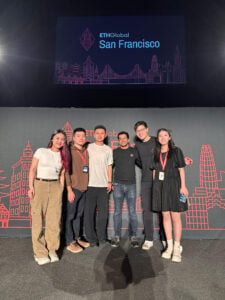A team of five Johns Hopkins students earned second place in two categories at the ETHGlobal Hackathon, held in San Francisco, California in mid-October. The 36-hour event, hosted by blockchain platform ETHGlobal, brought together industry professionals, students, and more for the largest internationally recognized blockchain hackathon competition.
The Hopkins team presented ChainSplash—a charitable donation application that leverages blockchain technology to ensure transparency, efficiency, and trustworthiness for both donors and recipient organizations—as a solution to challenges related to the collection and tracking of donations. The group’s teamwork and innovation secured second-place finishes in the “Best zkApp on Polygon” and “NounsDAO – Public Infrastructure” categories. Team members included Ryan Zhang, a graduate student in biomedical engineering, and Dorian Liu, Alex Hu, Aimee Liang, and Kaixin Du, all graduate students in the Johns Hopkins University Information Security Institute’s Master of Science in Security Informatics program.
The team began preparing for the competition early in the fall semester. Although the hackathon rules limited their ability to conduct extensive planning or development before the event, they were able to refine their project idea ahead of time. Liang mentioned that the event drew approximately 800 participants worldwide, with over 220 projects submitted by the end of the competition.
“At the start of the hackathon, we came together as a group to finalize the problem we were trying to solve,” explained Liang.
To optimize their time during the competition, the ChainSplash team split into three sub-groups focused on the app’s front-end development, back-end blockchain integration, and overall design. Regular check-ins ensured that each element progressed smoothly and integrated well with the rest of the project.
The team prioritized three core aspects during development: protecting donor privacy, leveraging blockchain technology to address corruption and guarantee public verification of donations, and making the platform efficient and user-friendly through the use of smart contracts, which enabled instant transactions and reduced overhead.

Members of the ChainSplash team working during the ETHGlobal Hackathon. Photo courtesy of the ChainSplash team.
Liu recounted the team’s reaction upon learning of their second-place achievement. “All of a sudden, the prize just popped up on the screen. We were not expecting it at all!” he said.
Participating in the competition allowed the ChainSplash team to network and learn from blockchain industry leaders. Looking forward, the team hopes to turn this into a deployable product and expand to involve additional Hopkins students.
The team received valuable mentoring and support from Matt Green, an associate professor of computer science in the Information Security Institute, and Xiangyang Li, an associate teaching professor and the director of the Master of Science in Security Informatics program.


